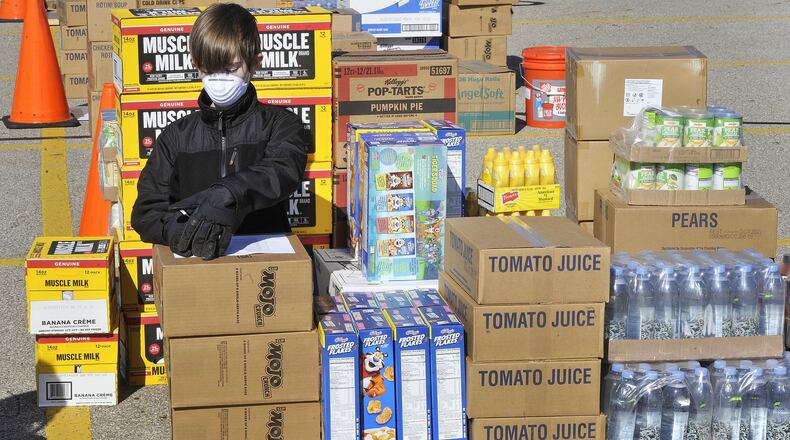“This is like a bucket brigade on a five-alarm fire,” Hamler-Fugitt said.
Complete coronavirus coverage from the Dayton Daily News
Before the coronavirus pandemic caused many people to lose their jobs, more than three out of 10 Ohioans had incomes low enough to use the food assistance system. Many people hadn’t recovered from the last economic crisis, Hamler-Fugitt said.
The increased need is evident in Dayton by the long lines for the drive-through at The Foodbank. People lined up hours before the drive-through food pantry opened and the line of cars stretched more than a mile.
The Foodbank served 541 households on April 1, more than 300 of them new to food assistance, said Lee Lauren Truesdale, chief development officer. It served 433 households April 2, more than 300 of them new to food assistance.
“People are having higher bills because more people are home or their childcare closed or they’ve been laid off from their job,” Truesdale said. “There have been a lot of unexpected things that people have had to respond to.”
MORE: DeWine & Amy: The popular pair have a theme song and video, thanks to Ohio animator
Everyone is eligible for the food assistance during the coronavirus pandemic.
The supply chains that the network of food pantries in Ohio rely on is strained, Hamler-Fugitt said.
About 43% of the food that the Ohio Association of Foodbanks get comes from donations. That source of supplies has dried up, Hamler-Fugitt said.
“Last month’s donors are this month’s clients,” she said. “We will do what we can with what we have.”
The Ohio Association of Foodbanks has estimated that they need $54 million per month to support all the foodbanks in its system, Hamler-Fugitt said.
CORONAVIRUS: Dayton Children’s creates response fund
In normal times, the Ohio Association of Foodbanks uses about $15 million a month, including all food sources, Hamler-Fugitt said. The association has requested $25 million in emergency funding from the state but has not heard back, Hamler-Fugitt said.
The Dayton Foodbank is getting supplies in every day, Truesdale said, including about $450,000 from a donation that Amazon founder Jeff Bezos made to Feeding America.
Bezos recently made a $100 million donation to Feeding America to help member foodbanks, like The Foodbank in Dayton, deal with increased need during the pandemic.
The Foodbank will give half of the donation to its partner agencies across Montgomery, Greene and Preble counties. The other half will be spent on sourcing food.
“Food is what people need most,” Truesdale said. “And we’re really excited to be able to help our partner agencies respond to the increased need we’ve seen.”
PHOTOS: Convoy of Hope food relief
Food pantries in Ohio are also having to deal with reduced staff due to schools closing and health concerns.
The Foodbank in Dayton has 20 people working right now, Truesdale said, down from its usual 31 staff members.
A few food pantries in the Dayton area received more than 40,000 pounds of food this week.
Former U.S. Ambassador Tony Hall arranged for a semi-truck trailer full of food from Convoy of Hope, a faith-based nonprofit, to go to the Christian Life Center. The center then delivered the food to 10 inner city churches.
The churches that received food on Thursday were New Hope Church, Gateway Cathedral in Trotwood, All Nations Bible Fellowship, God’s Lighthouse Community Church, Linden Avenue Baptist Church, Mars Hill Church, Gethsemane Church of God in Christ, Soul Winners for Jesus Christ and Trinity Lighthouse Church in Northridge.
“Our churches serve a key role in helping the community during emergencies like we have now,” Hall said via FaceTime on Thursday. “This food is going directly into the neighborhoods where it’s most needed.”
Churches are not strangers to adversity, said Pastor Norman Scearce of Gateway Cathedral church.
“It is when the world is in crisis that the church is at her best,” Scearce said.
In addition to the food from Convoy of Hope, Christian Life Center bought about $5,000 of canned goods and food from Meijer. Meijer also donated about $2,000 of food, said Mark Willis, director of the Hall Hunger Initiative.
People who haven’t had to use the charitable food system before often don’t think they’re needy enough or in enough trouble to access those services, Truesdale said.
CORONAVIRUS: 1,600 new cases per day predicted at state’s peak, Acton says
“We just want to make sure that anyone who is struggling knows they can call us and we can walk them through everything they’d need to get help,” she said.
Anyone who needs help should call the Foodbank’s emergency line at (937) 949-4096. Truesdale also suggested calling the United Way’s Help-Link number at 211 or (937) 225-3000 to get connected to a variety of resources.
About the Author

